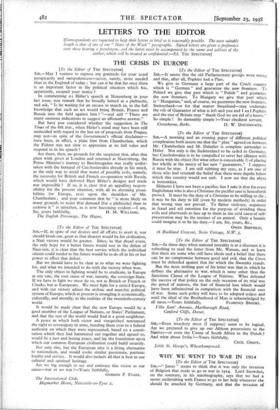THE CRISIS IN EUROPE
LETTERS TO THE EDITOR
[Correspondents are requested to keep their letters as brief as is reasonably possible. The most suitable length is that of one of our " News of the Week" paragraphs. .Signed letters are given a preference over those bearing a pseudonym, and the latter, must be accompanied by the name and address of the author, which will be treated as confidential.—Ed. THE SPECTATOR] [To the Editor of THE SPECTATOR]
Sut,—May I venture to express my gratitude for your usual perspicacity and outspokenr.ess—never, surely, more needed than in the England of today ; but can it be that for once there is an important factor in the political situation which has, apparently, escaped your notice ?
In commenting of Hitler's speech at Nuremberg in your last issue, you remark that he broadly hinted at a plebiscite, and ask, " Is he waiting for an excuse to march in, in the full knowledge that such an act would bring Britain, France and Russia into the field against him ? "—and add " There are many ominous indications to suggest an affirmative answer."
But have you considered whether the suggestion in The Times of the 8th inst., when Hitler's mind may have been still undecided with regard to the last set of proposals from Prague, may .not—in spite of the Government's official disclaimer— have been, in effect, a plain hint from Chamberlain, which the Fiihrer was not slow to appreciate at its full value and respond to in his speech ?
Are there, then, no grounds for the suspicion that, after this plain wink given at London and returned at Nuremberg, the Prime Minister's journey to Berchtesgaden was really under- taken with the betrayal of Czechoslovakia already in his mind, as the only way to avoid that worst of possible evils, namely, the necessity for British and French co-operation with Russia, which would have defeated Herr Hitler's designs and made war impossible ? If so, it is clear that an appalling respon- sibility for the present situation, with all its alarming possi- bilities for Europe, rests upon the shoulders of Mr. Chamberlain ; and your comment that he " is more likely on many grounds to resist that demand [for a plebiscite] than to endorse it " is mistaken, as is now becoming evident.—I am, Sir, yours faithfully, H. M. WILLIAMS. The English Parsonage, The Hague.






































 Previous page
Previous page